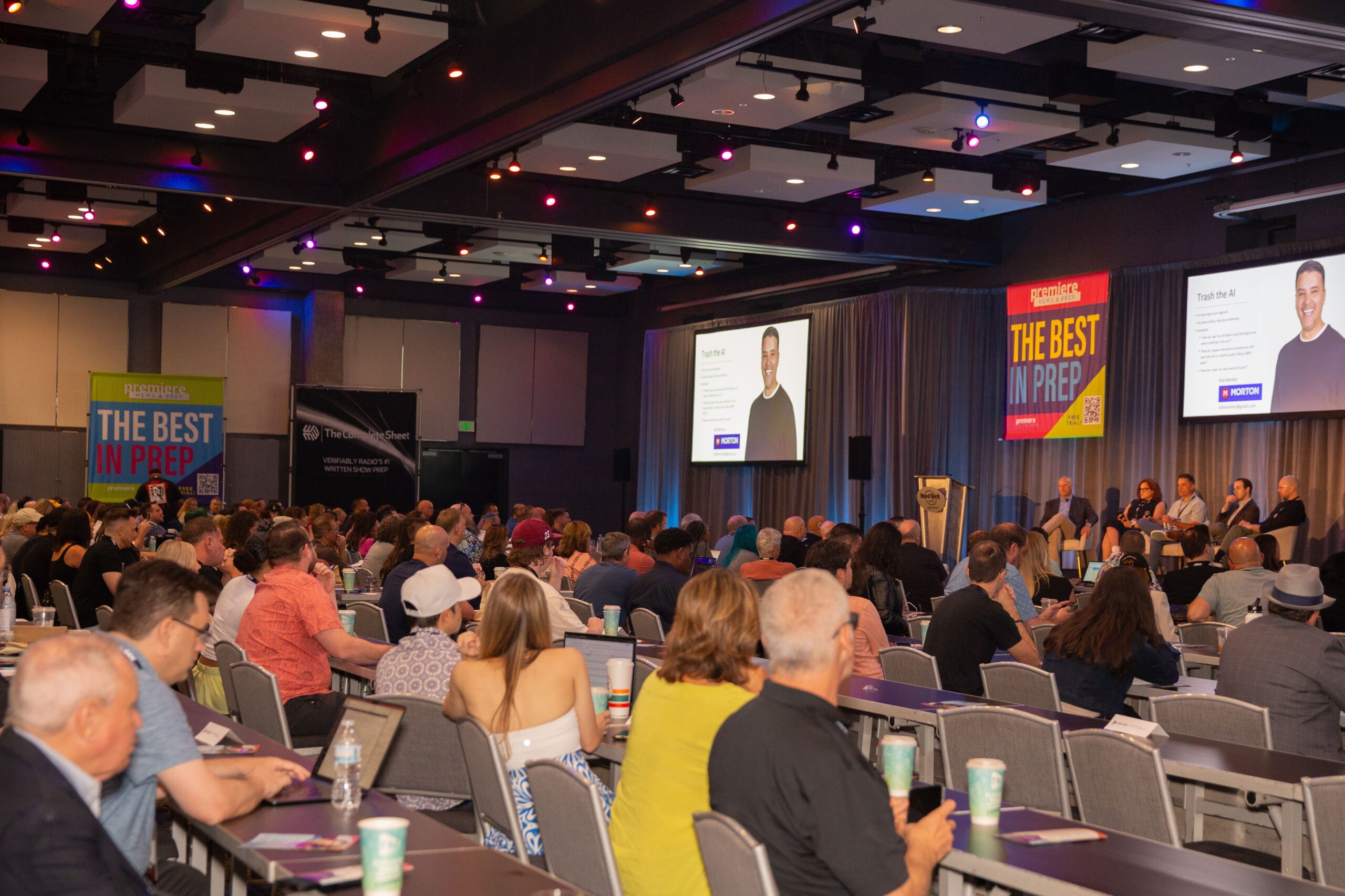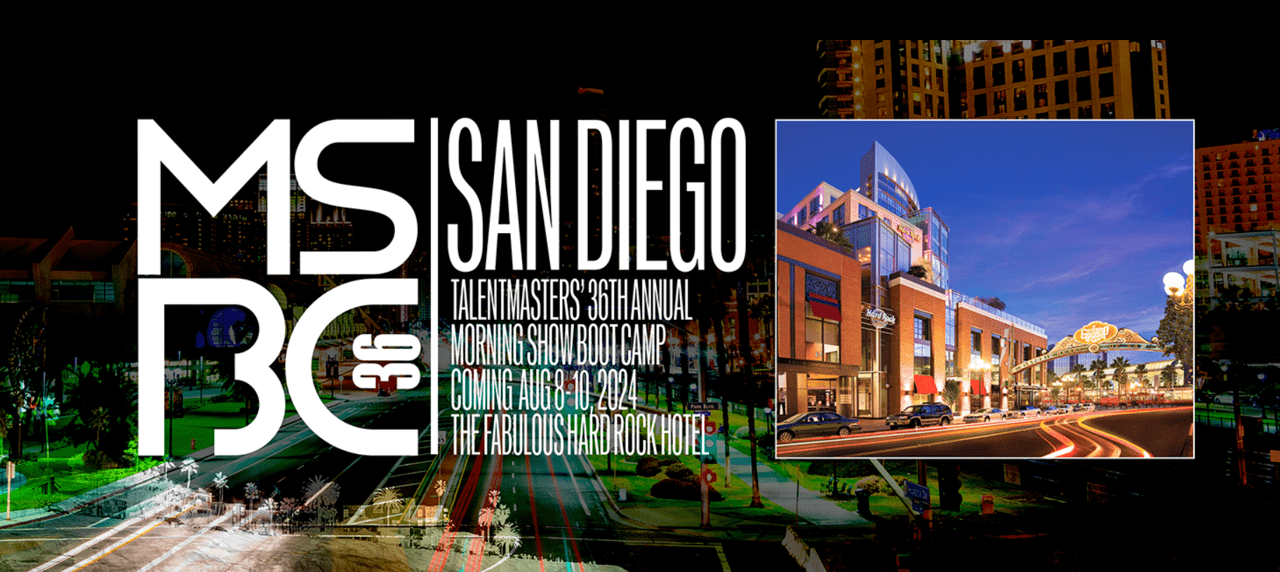
As the radio broadcasting industry has been roiled by change and the increasing pressure to generate revenues and profits, other changes that have rocked the business may not be as apparent. But the way radio gathers and communes has also undergone change in recent years.
In short, there are fewer conventions, and looking a bit deeper, a steady decrease where radio’s content creators can get together. In just the past few years, the Radio Show, the All Access Media Summit, and Conclave have all been retired (or put “on hold”). On the public radio side, the PRPD Content Convention went on hiatus this year, but will fortunately return in 2025 in Salt Lake City. Still, this is the first year in decades (COVID aside) that public radio’s programmers have had a year off.
I would be remiss if I didn’t mention Christian radio has been a shining exception, thanks in no small part to the Christian Music Broadcasters’ commitment to bringing its programming community together for the always-impressive Momentum show. Michelle Younkman’s organization continues to dazzle with an expertly organized and executed show.
But on the commercial side of the spectrum, the absence of content gatherings is glaring, making it even more challenging for radio to get out of its content rut. Cynics might argue the reason why there are fewer programming gatherings has been due in no small part to a lack of interest and flagging attendance. And while there may be some truth to that assessment, Morning Show Boot Camp – now in its 36th year – has consistently bucked the odds, continuing to put butts in seats.

This year’s show in San Diego last week was no exception. While a West Coast location might have been considered risky, due in no small part to rising airfare prices, Don Anthony’s show geared exclusively to radio personalities continued to buck the trends. In some ways, this year’s Boot Camp served as a microcosm for much that is right and what is broken about radio in 2024.
As our Techsurveys have clearly illustrated over the past six years, the appeal of radio personalities now overshadow the music. There’s a great deal of logic to this important finding. Talent is proprietary, unlike anything else in radio and many other audio media. Music, however, has been commoditized, starting with the iPod, and moving directly to streaming services like Spotify. While broadcast radio may indeed be free, millions are willing to pay a monthly fee in order to create personalized playlists without commercial interruption on platforms like Spotify.
Others think nothing of shelling out several dollars a month for the variety and lack of commercials on SiriusXM. While the world once turned to radio as a main source of music and artist discovery, consumers have moved on to DSPs and other web platforms to learn about what’s new and where to hear it.
Broadcast radio’s secret sauce is personality, of course, and the great news is that more than 500 of them were dedicated enough to show up in San Diego to network, learn from one another, and draw inspiration from each other – all against the backdrop of a radio industry that is often guilty of not giving them the respect and credit they deserve.
The fact is, some in the industry’s leadership ranks simply ignore this event – to their own peril. Sadly, this is nothing new. While group programmers have consistently attended Boot Camp (where better to recruit new talent?), CEOs, COOs, and CFOs are usually MIA. And their lack of presence at this event speaks volumes about the state of an industry that now bids farewell to an institution like WCBS-AM like it was a disposable diaper.
All those RIFs – and they were happening while the assembled masses gathered at Boot Camp – are expected. Talent and other personnel are told “It’s just business.” But when more than eight in ten personalities feel “taken for granted” by their employers, there’s a fundamental flaw in the way the business has come to operate. During my AQ6 research presentation, I once again showed this updated slide. It is painful, but truthful.


Photo: Radio Ink
There are exceptions – and they are noteworthy. For the last several years, Hubbard Radio has shown up in force, wisely reminding talent how much they appreciate their contributions. CEO Ginny Hubbard (pictured with me) is always present, sending several of the company’s stellar personalities and programmers. Year in and year out, Hubbard maintains strong visibility and presence at Boot Camp. Over the last many years, they’ve sponsored the hot ticket to the kickoff party the night before the start of the conference.
And why not. Imagine a convention of pro football players open to the entire league, including marketers, agents, promoters, and those who provide services to the athletes. You’d like to think a few owners and executives would show up, if nothing else to hear what the players are thinking and talking about. When your VIPs – football players or on-air talent – gather in one place, it’s a chance to get closer to them and better understand their issues – and ownership’s opportunities.
As our AQ6 study of industry air talent reminds us, however, the relationship between talent and the companies they work for has frayed particularly since the onset of the pandemic. While their feelings about the stations and their parent companies have long been strained, recent scores are nothing to be proud about:

If you take the time to talk with them, many radio personalities will tell you they don’t often feel seen or heard. In an industry still full of family businesses, this is a real miss. You expect things to be impersonal if you work for Microsoft or General Motors. But radio?
Now I’m the first to admit that some of earliest memories of listening to stories from some of radio’s most talented personalities often included derision of “the man, “the suits,” and management in general. Since the beginning of radio time, there’s been a creative rift, the always familiar “philosophical differences,” and a sense of talent feeling misunderstood by their employers.
Today, radio broadcasters are at a pivotal point. It was palpable once again at Boot Camp. There is a growing awareness that while parent companies may continue to institute RIFs, layoffs, and even buyouts, execs are squirming over their revenue numbers, their margins, and their overall financial well-being. The truth is, this is not exactly a fun time to own radio stations.
But sadly, too many radio’s executives treat Boot Camp like the “kid’s table” at a family reunion. The fact is, these creative professionals are dead serious about their industry, their careers, and serving their communities. They go to Boot Camp to learn, not to party. And the connection between generations of on-air talent is a thing to behold. Unlike other sectors of the radio industry, mentorship has always been an important component to Boot Camp.
Young, fledgling radio superstars appreciate the advice they get from the “regulars” – veterans like B. J. Shea, Corey Dylan, Bob Rivers, Michelle McKormick, Paul Castronovo, and so many other “fixtures” at this event. They know it is part of their legacy and duty to pay it forward, passing along their skills, advice, and these days, lots of encouraging words. (More on them tomorrow.)
And the young talent enthusiastically in attendance at Boot Camp appreciate it. Whatever generation gaps exist in real life, they seem to melt away at Boot Camp. None of the veterans looks down at today’s talent. And conversely, the rising stars don’t resent their ancestors on the airwaves – they have a sincere desire to learn from them. When I talk to heritage talent at this event, they have a realization about just how challenging today’s tough conditions in radio truly are. There is genuine empathy, respect, and caring toward today’s stars of tomorrow.
I watched them hanging on every word from Bobby Bones (pictured), wonderfully open to explaining it all in front of a packed room, vulnerabilities and all. If you’re used to executives spewing corporate speak at conventions, the conversation at Boot Camp is refreshingly real. The attendees wouldn’t have it any other way. They may not all be grizzled veterans, but they call bullshit when they’re hearing a line of crap from whoever’s on stage. Don’t get me wrong – this is a respectful, appreciative audience, paying attention to every word spoken on panels, interviews, and keynotes.
and all. If you’re used to executives spewing corporate speak at conventions, the conversation at Boot Camp is refreshingly real. The attendees wouldn’t have it any other way. They may not all be grizzled veterans, but they call bullshit when they’re hearing a line of crap from whoever’s on stage. Don’t get me wrong – this is a respectful, appreciative audience, paying attention to every word spoken on panels, interviews, and keynotes.
No question about it – this is my favorite conference of the year. Given all the research studies I present, the MSBC crowd is always the most attentive. No one’s on their phones or whispering to each other. They are looking at the data, connecting the dots, and determining how it applies to them.
And it stands to reason. Many attendees pay their own way. Boot Camp in an investment in their futures, their careers. They are determined to learn as much as they can, experiencing as much as possible while hanging out with their brothers and sisters behind the mic.
There are important lessons to be learned at Boot Camp if the 2024 iteration of radio is willing to take the time to hear it. And despite the bad news ricocheting around the industry each week, it doesn’t take all that much to reinforce the fact management cares about their talent. While many in radio aren’t expecting big raises this year for obvious reasons, a dinner coupon, a small perk or prize, and even an “atta boy” or “atta girl” from the corner office goes a long way in the Appreciation Department.
Kudos to Don Anthony (who Greg Strassell accurately refers to as “the Lorne Michaels of Boot Camp”) and his fine team, including Marie LeMaitre and Danny Vigil who keep it all together.
Hope to see you next year at Boot Camp!
We will be scheduling an all-industry presentation of AQ6 soon. Stay tuned for details. – FJ
Originally published by Jacobs Media






